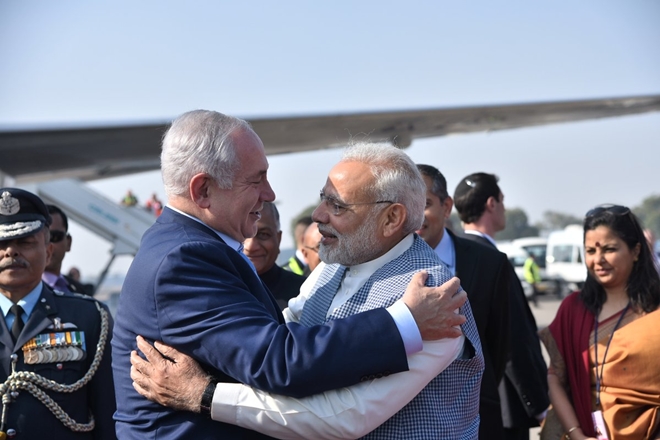www.aljazeerah.info
Opinion Editorials, March 2019
Archives
Mission & Name
Conflict Terminology
Editorials
Gaza Holocaust
Gulf War
Isdood
Islam
News
News Photos
Opinion Editorials
US Foreign Policy (Dr. El-Najjar's Articles)
www.aljazeerah.info
The Balakot Air Strike Points to the Indo-Israel Nexus Against Pakistan By Aisha Noor Al-Jazeerah, CCUN, March 13, 2019 |
 |
 |
|
| Netanyahu-Modi: An anti-Islamic alliance |
Indo-Israel nexus against Pakistan
The Balakot strike was designed to demonstrate that India had an upper hand because of its military superiority and it had the space to escalate if it wanted to. If India had been able to do so this successfully, it could have fundamentally changed the India-Pakistan dynamic as it could have setup a template for future Indian military action. In a major development, a credible report was received regarding the launch of an attack on Pakistan on Feb 27, by India and Israel, along with a third an unnamed nation from another side. India had planned to carry out a missile attack on Pakistanís two cities Karachi and Bahawalpur via Rajasthan. It was learnt that Israel had an aim to dent Pakistanís nuclear assets.
If history is any guide, Indo-Israel nexus is not something new when it comes to strategic cooperation between the two. Israel provided military equipment and surveillance to India in 1965 and 1971 wars , in 1999 Karghil and many other times. According to Dr Tughral Yamin, Intelligence reports in 1986-87 suggested that the India, Israel and Soviet Union were colluding to attack Pakistani strategic installations. Another case of high tension known as the Crises of spring 1990, led to the deployment of troops along the borders. By the spring 1990, the revolt in Jammu Kashmir was in full flow. V. P Singh the Indian PM, gave a speech calling upon the Indians to be psychologically prepared for war and warned Pakistan. Indo-Israel forces were planning to destroy Pakistanís nuclear assets.
In December 2001, India mobilized forces against Pakistan in retaliation against an assault by alleged Pakistani backed Kashmiri militants on its parliament. Indiaís demands were met and a set of militants were handed over to them on Dec 20. But India mobilized forces with threatened war showing Indiaís aggressive attitude once again. On Nov 26, 2008, in Mumbai attack, the Government of India blamed terrorist groups based in Pakistan. Pakistan offered a director level officer to go India and be part of investigations but India suspended the Peace process. Two airspace violations by Indian aircraft were reported, one towards Muzaffarabad and other towards Lahore. The Pakistani airbases were alerted to the possibility of Indian strikes and combat air patrols were flown over Lahore and Islamabad.
Pakistan has perhaps taken more risks than any other nation in Americaís ďwar on terror.Ē Yet it remains most insecure about its relations with Washington. Pakistan remains exposed to the dangers of pre-emptive strikes from two of Americaís close allies in the war on terror and they are ≠India and Israel.
Thousands of people have been killed in Pakistan due to terror attacks since the beginning of the war on terror. Over 140 children were killed in an Army Public school in Peshawar on December 16, 2014. Wave of conspiracies, intrigues and terrorism ruined Pakistanís peace but Pakistan never showed such an aggressive attitude for the neighboring country as Pakistan always seek for regionís peace and stability. As For Pakistanís nuclear program is concerned ,it is conceived as an essential safeguard against the Indian nuclear weapon capability and for Pakistanís security, while India wanted to have an image of great power and threat Pakistan. Good fences make good neighbors.
History simply does not support the hypothesis that religion is the major cause of conflict among nations. Mostly these wars were to control borders or for territorial conquest .But this is not to say that religion is not a cause of conflict. Obviously it is. It is evident that India and Israel have anti-Islam nexus. India has occupied the territory of Kashmir, while Israel is occupying a vast area of Palestine.
Israel is considered a key weapons supplier to the Indian army, and the deals between the two countries in recent years are estimated at a billion dollars.
Pulwama attack either an inside job for winning elections and to facilitate BJP or something else, but it is clear that India with her allies wants to indulge Pakistan in war to make Pakistanís economy weak. Recently, KSA and Pakistan signed several MoUs with investments worth $20 billion across different areas. Crown Prince Mohammed Bin Salmanís state visit is the clear indication of the fact that Pakistan has succeeded in providing secure political and economic space for investments across different sectors. W hen Pakistan is going to be hub of cultural exchanges with economic development, war is going to be imposed.
The conflict in South Asia has global implications. India and her allies cannot enhance their own security by making Pakistan feel insecure. If India chooses to escalate from here, it will not be about India and Pakistan anymore, it will be about the region. It is obvious that the creation of stability may not necessarily be motivated by noble sentiments.
***
Aisha Noor is a writer, columnist, and a lecturer in English, from Lahore, Pakistan, currently living in Karachi.
***
Share the link of this article with your facebook friends
|
|
|
|
||
|
||||||


